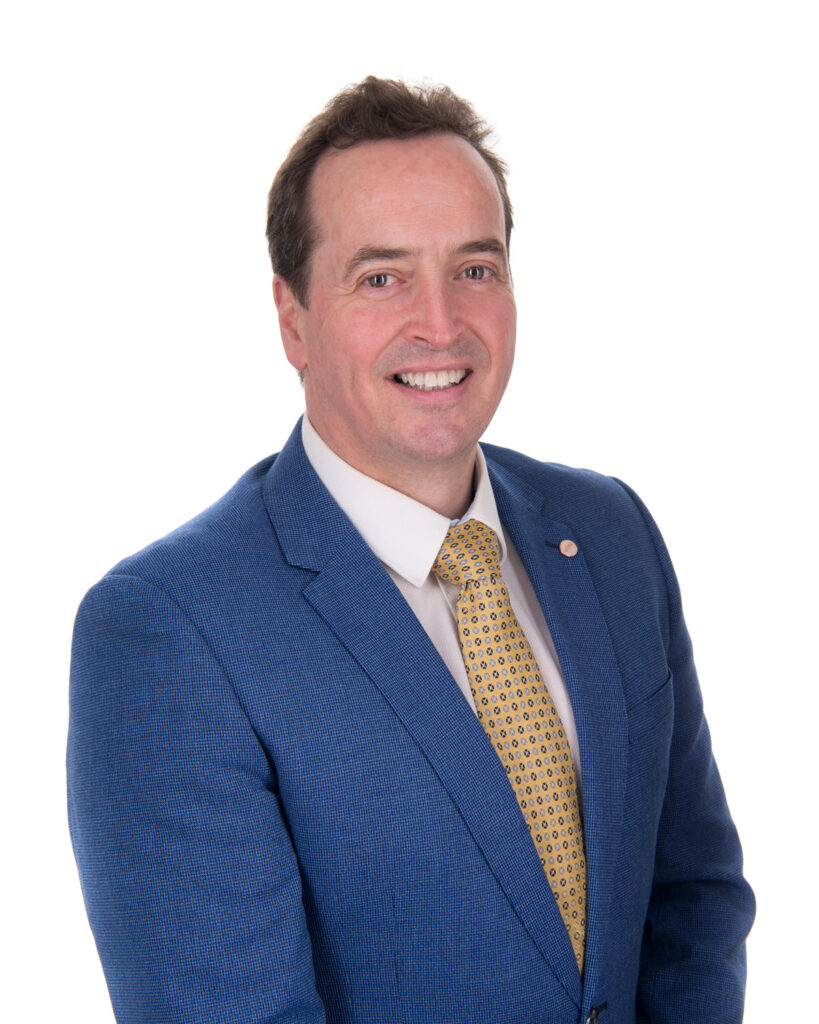Irish Pharmacist speaks with IPU President Tom Murray about the opportunities and serious challenges for pharmacy during his tenure

Donegal community pharmacist Tom Murray understands the issues facing the profession better than most. A pharmacy owner since 2001, he has served in a number of positions within the IPU, including as Chair of its Finance Committee.
Over the years, Mr Murray has seen and experienced both change and a lack of change in the profession, including that fees for administering community drug schemes have been frozen for 16 years. As new IPU President, he has stated that one of his priorities will be to support ongoing efforts to introduce a €6.50 flat fee structure for all pharmacies.
Mr Murray spoke with Irish Pharmacist (IP) about these and other issues that will occupy his mind during his time as President.
He began by commenting on the “overall success” of the recent IPU Annual Conference held in Westmeath, noting the high amount of engagement with pharmacists, including younger members of the profession.
Vision
On the comments at the conference from Minister for Health Steven Donnelly, he said: “He acknowledged the crucial role that pharmacists play in healthcare, and he acknowledged that we haven’t been either empowered or supported or paid to allow us to do what is possible. He has a vision for pharmacists to do an awful lot more.” On the the establishment of an Expert Taskforce to support the expansion of the role of pharmacists in Irish healthcare, Mr Murray said: “Obviously, that is dictated by what will come out of the Taskforce, but behind the Task Force is a genuine belief from this Minister that pharmacists can and could do more in the right circumstances.”
He was also happy that the Minister echoed pharmacists’ feelings on the level of bureaucracy in the profession. “I was delighted to hear him say that the red tape and bureaucracy have simply gotten out of control, and announced that he would ask his department to do an urgent review on the level of administration and paperwork that has been foisted upon us. That’s a big step in the right direction… I do intend to hold the Minister true to his word and demand concrete action in that area, rather than just words.”
This is one of the issues facing pharmacists that Mr Murray intends to address — rampant red tape is one of the most pressing problems consistently raised by practitioners.
Investment
One of the other most pressing problems facing the profession is the need for equitable fees and investment in, and sustainability of, the profession. “Increasing the dispensing fee is a huge issue,” Mr Murray told IP. “The Minister acknowledged that there hasn’t been an increase in this fee for a very long time and that there has been a period of high inflation, but he wasn’t very committal on how a fee increase could be achieved, however he did say he was aware that the IPU is being very forcible with his department.”
Mr Murray is part of that negotiating team that has met with the Department of Health 10 times over the past 12 months. “I can say without question that I and other members of the team have been really strong on our demands to address not just the 16-year pay freeze, but also the sustainability of the sector going forward.”
New funding model
Mr Murray has spoken previously about the urgent need for a revised funding model, and he told IP that this would help to provide a good foundation to maintain existing services and provide a platform to deliver further results in healthcare. “Eighty per cent of community pharmacists’ time is spent on delivering state services through the community drug schemes,” he said. “A huge proportion of that time is loss-making because the draconian and regressive fee structure. It’s been 16 years since there has been any increase in the dispensing fee and the average dispensing fee has reduced from €6 in 2009, to €4.55 per item,” he continued. “In the same period, the average cost for dispensing an item has increased by 20 per cent. Along with that, there has been business inflation and an increase in the costs of rates, rents, insurance, energy, and labour costs. So we have been hit by the double-whammy of business costs going up, staff pay rises, and yet we have received no funding to back us up.”
The increased administrative burden during this time has paradoxically resulted in the need to increase staff, creating a self-perpetuating problem for pharmacy owners. Also, in the average pharmacy, two-thirds of the business can be dependent on the delivery of State services. Studies have shown that 80 per cent of a pharmacist’s time is spent delivering 66 per cent of their business, “and a lot of that is loss-making,” said Mr Murray.
Fees
While there has been greater recognition in recent years of the vital role that pharmacies play in the primary care system, this recognition has not been translated into a review on fees provided for these services. This has become especially apparent with the increased funding for GP services that have not been applied in the pharmacy sector. Further, 10 per cent of pharmacies in rural areas are loss-making, which is unsustainable in terms of both these businesses and their communities.
While the Minister recognises the skills and potential of pharmacies, the Taskforce is working in negotiations on translating this recognition into an equitable fee system. This brings the conversation back to the need for a new funding model for pharmacy, and what this might look like.
“Obviously, recognition of the core dispensing activity is really important,” said Mr Murray. “Me and a couple of colleagues from the IPU attended the World Pharmacy Council in Lisbon, where we had discussions with pharmacy representatives from 12 countries… initially, the conversation was around practising at full scope, but it soon became obvious that what’s important is recognising the clinical core role of safe and appropriate supply of medicines. This is a unique role provided by pharmacists, so the new funding model has to have investment in core dispensing services,” he told IP. “That can ensure the stability of the community services, before we can expand the range and scope of services.
“So, what are we looking for?” he continued. “I was clear with the Minister about this — the dispensing fee has to move to €6.50 per item, and that needs to be a fixed fee, so no more tiered or regressive fees, whereby the State values patients who come in for the second, third or fourth week to the pharmacy less than the people who come in on the first week. This has the pharmacy essentially working at a loss to support these patients.
Stability
“It has to be public sector-linked,” said Mr Murray. “That removes the constant need for negotiations and would provide stability, and allow our members to have the financial certainty to make decisions for the future, and perhaps to invest in their pharmacy.”
Returning to the increased administrative burdens, Mr Murray said: “I would like to see the administrative fee for the prescriptions processed under the community drugs schemes to account for that increase in administrative tasks.
“There are specific fees for services provided under the discretionary hardship arrangement, but we need to acknowledge the extra care, administration and delayed payment involved,” he pointed out. “It can take three-to-nine months to get paid for a hardship item and if you ask any pharmacist what scheme causes them the most difficulty, almost all of them will say, ‘it’s the hardship scheme’. We do that on behalf of the State, and yet the amount of administration for that is shocking, so there should be a patient care fee for that scheme, as well as for others perhaps. For pharmacists, that’s a lot of hardship to get €5 after nine months, for example.”
He also expressed a desire to see acknowledgement that pharmacies were unsupported during Covid-19 in terms of managing staff and supplying PPE, in comparison to other healthcare providers.
Burnout
He also touched on the FMD system, and the fact that pharmacists were required to provide their own scanners, which he described as “ridiculous”. “I think it’s extraordinary that this law was brought in by the EU and implemented by this Government, which then said to private practising professionals, ‘go and buy the equipment yourselves’. I would like to see these FMD costs covered as well.”
These cumulative administrative burdens have led to increased burnout among pharmacists, and this is a topic Mr Murray said he is also keen to address. “We have surveyed our pharmacists and over 90 per cent said they are facing burnout from the increased administrative burdens,” Mr Murray told IP. “There are 22 distinct community drug schemes and arrangements that we now provide on behalf of the State. When the existing pharmacy contract came along in 1996, there were four. So there are more than five times the original schemes, but this brings in a lot more than five times the administration [burden].”
‘Ridiculous’
“Since 2013, there has been around a 300 per cent increase in circulars from the PCRS, and each of these has implications for the practice that we have to oversee. Also, the fact that we have to print a Healthmail before it becomes a legal document… prescriptions used to be provided by the State. Now, the pharmacist has to print them, pay the cost for that, go through the admin, and endorse them — there are 1,700 pharmacies in Ireland printing 78 million pieces of paper per year for the community drug schemes. In this day and age, that we have to endorse a document with a stamp that has been emailed to us, is ridiculous.”
In addition, pharmacists are spending an average of nine-to-10 hours per week dealing with medicine shortages, which is a time commitment that customers do not see.
“Pharmacists have shown their resilience but that resilience that’s embedded in us is now at breaking point,” he concluded. “If you look at the survey done by the PSI, showing that 30 per cent of pharmacists are looking at changing their current role and 23 per cent are thinking of leaving the profession altogether… [it shows that] rather than spending time on patients, we are spending time on paperwork.
“We are now at the point where these final straws are breaking the camel’s back.”







